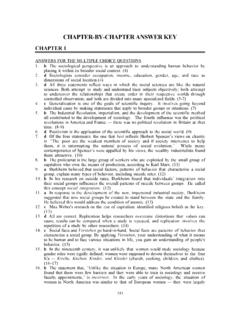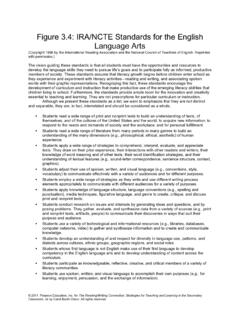Transcription of CHAPTER-BY-CHAPTER ANSWER KEY
1 CHAPTER-BY-CHAPTER ANSWER KEY. CHAPTER 1. ANSWERS FOR THE MULTIPLE CHOICE QUESTIONS. 1. b The sociological perspective is an approach to understanding human behavior by placing it within its broader social context. (4). 2 . d Sociologists consider occupation, income, education, gender, age, and race as dimensions of social location.(4). 3. d All three statements reflect ways in which the social sciences are like the natural sciences. Both attempt to study and understand their subjects objectively; both attempt to undercover the relationships that create order in their respective worlds through controlled observation; and both are divided into many specialized fields.
2 (5-7). 4. c Generalization is one of the goals of scientific inquiry. It involves going beyond individual cases by making statements that apply to broader groups or situations. (7). 5. b The Industrial Revolution, imperialism, and the development of the scientific method all contributed to the development of sociology. The fourth influence was the political revolutions in America and France there was no political revolution in Britain at that time. (8-9). 6. d Positivism is the application of the scientific approach to the social world. (9). 7. d Of the four statements, the one that best reflects Herbert Spencer's views on charity is The poor are the weakest members of society and if society intervenes to help them, it is interrupting the natural process of social evolution.
3 While many contemporaries of Spencer's were appalled by his views, the wealthy industrialists found them attractive. (10). 8. b The proletariat is the large group of workers who are exploited by the small group of capitalists who own the means of production, according to Karl Marx. (11). 9. a Durkheim believed that social factors, patterns of behavior that characterize a social group, explain many types of behavior, including suicide rates. (12). 10. b In his research on suicide rates, Durkheim found that individuals' integration into their social groups influences the overall patterns of suicide between groups. He called this concept social integration. (12).
4 11. a In response to the development of the new, impersonal industrial society, Durkheim suggested that new social groups be created to stand between the state and the family. He believed this would address the condition of anomie. (12). 12. c Max Weber's research on the rise of capitalism identified religious beliefs as the key. (13). 13. d All are correct. Replication helps researchers overcome distortions that values can cause, results can be compared when a study is repeated, and replication involves the repetition of a study by other researchers. (14). 14. c Social facts and Verstehen go hand-in-hand. Social facts are patterns of behavior that characterize a social group.
5 By applying Verstehen, your understanding of what it means to be human and to face various situations in life, you gain an understanding of people's behavior. (15). 15. b In the nineteenth century, it was unlikely that women would study sociology because gender roles were rigidly defined; women were supposed to devote themselves to the four K's Kirche, K chen, Kinder, und Kleider (church, cooking, children, and clothes). (16-17). 16. b The statement that, Unlike the situation in Europe, many North American women found that there were few barriers and they were able to train in sociology and receive faculty appointments, is incorrect. In the early years of sociology, the situation of women in North America was similar to that of European women they were largely 353.
6 CHAPTER-BY-CHAPTER ANSWER KEY. excluded and their work ignored. As a result, many turned to social activism, especially working with the poor and immigrant groups. Many male sociologists who worked as professors denied female sociologists the title of sociologist, preferring to call them social workers. (17). 17. c W. E. B. Du Bois was an African-American sociologist who wrote extensively on race relations. In both his personal and professional life, he experienced prejudice and discrimination. His commitment to racial equality led him to establish the NAACP. (19- 20). 18. c Sociologists who conduct research for government commissions or agencies investigating social problems are practicing applied sociology.
7 (21). 19. b Symbolic interactionism is the theoretical perspective that views society as composed of symbols that people use to establish meaning, develop their views of the world, and communicate with one another. (23). 20. c In explaining the high divorce rate, the symbolic interaction perspective would focus on explanations such as emotional satisfaction, the meaning of children, and the meaning of parenthood. (23-25). 21. d According to Robert Merton, an unintended consequence that can hurt a system's equilibrium is a latent dysfunction. (26). 22. d Industrialization and urbanization have undermined the traditional purposes of the family, according to theorists using functional analysis.
8 (29). 23. a Karl Marx first asserted that conflict is inherent in all relations that have authority. 24. c Feminists often focus their research on the oppression of women by men. (29). 25. b Conflict theorists might explain the high rate of divorce by looking at societies basic inequalities between males and females. (29). 26. d Since each theoretical perspective provides a different, often sharply contrasting picture of our world, no theory or level of analysis encompasses all of reality. By putting the contributions of each perspective and level of analysis together, we gain a more comprehensive picture of social life. (30-31). 27. c The first phase of sociology in the United States stretched from the founding of the first departments of sociology in the last decade of the nineteenth century into the 1940s.
9 This phase was characterized by an interest in using sociological knowledge t o improve social life and change society. (31). 28. a The purpose of pure or basic sociological research is to make discoveries about life in human groups, not to make changes in those groups. On the other hand, applied and clinical sociology are more involved in suggesting or bringing about social change. (31). 29. c In recent years, more sociologists have sought ways in which to apply their research findings to solving social problems. This represents a return to applied sociology. (31). 30. d The author of your text suggests that globalization, the breaking down of national boundaries because of communication, trade and travel, is very likely going to transform sociology in the United States.
10 As global issues intrude more into society, sociologists will have to broaden the scope and focus of their research. (32). ANSWERS FOR TRUE-FALSE QUESTIONS. 1. True. (4). 2. True. (4). 3. True. (6). 4. True. (6). 5. False. Sociologists focus on external influences (people's experiences) instead of internal mechanisms, such as instincts. (7). 6. False. Sociology has many similarities to the other social sciences. What distinguishes sociology from other disciplines is that sociologists do not focus on single social institutions, they study industrialized societies, and they stress factors external to the individual. (8). 354. CHAPTER-BY-CHAPTER ANSWER KEY. 7. True.














